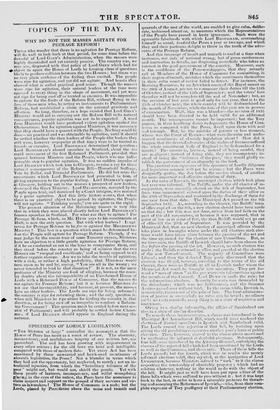TOPICS OF THE DAY.
WHY DO NOT THE MASSES AGITATE FOR PEERAGE REFORM?
TnusE who wonder that there is no agitation for Peerage Reform, will do well to look back at that period, for some time before the downfal of Lord GREY'S Administration, when the masses were highly dissatisfied and yet entirely passive. The country was, we Thav say, disgusted with that policy of Lord GREY which had for sisobject to spare the House of Lords by keeping clear of questions likely to produce collision between the two Houses ; but there was no very plain evidence of the feeling thus excited. The people 'were ripe for agitation, end yet did not agitate. And herein they showed what is called practical good sense. Though the masses were ripe for agitation, their natural leaders at the time were opposed to every thing in the shape of movement, and yet were not ripe for being east off or treated as enemies. It was impossible to agitate for the fruits of the Reform Bill, without flying in the face Of those men who, by acting as instruments to Parliamentary Reform, had established a claim on the national gratitude and aft etion. So long, therefore, as a hope existed that Lord GREY'S Ministry would aid in carrying out the Reform Bill to its natural consequences, popular agitation was not to be expected. A word from Ministers would have produced violent agitation against the Obstructives; but for agitation against Ministers, it was necessary that they should have a quarrel with the People. Nothing could be done—no practical end was obtainable by agitation, until it should be settled whether the then leaders of the People (for leaders they still were, however unpopular at that time) were to be treated as friend: or enemies. Lord BROUGHAM determined that question : Lord BR OUGH AM'S absurd speeches in Scotland, about the too rapid movement of the first Reformed Parliament, provided that quarrel between Minsters and the People, which was one indis- pensable step to popular agitation. It was no sudden impulse of Lord Dtrunem which took him to Glasgow, to raise a cry for those -natural consequences of the Reform Bill—Household Suffrage, Vote by Ballot, and Triennial Parliaments. He did but seize the opportunity which Lord BROUGHAM had presented to him, of giving expression to the popular feeling. Lord DURHAM'S speech at Glasgow, holding out to the masses a prospect of new leaders, destroyed the GREY Ministry. Lord MELBOURNE, accepted by the ople upon trial, awl dismissed by a Court intrigue, was restored by tr polar agitation. And this little history shows, that when there is no practical object to be gained by agitation, the People will not agitate. " Thinking people," you are quite in the right.
The present situation of the Reforming masses is very like that in which they were placed shortly before Lord BROUGHAM'S famous speeches in Scotland. For what are they to agitate ? For Peerage Reform, which, as Mr. Hurr says to his constituents at Bull, is now the only question. But with what leaders ? Is agi- tation for Peerage Reform to be for or against the MELBOURNE Ministry ? This last is a question which must be determined be- fore the People will agitate for Peerage Reform. Though, if we may judge by the recent tone of some Treasury papers, Ministers have no objection to a little gentle agitation for Peerage Reform, if it be so conducted as not in the least to compromise them, still they stand before the country as being of opinion that the two
'louses are "coequal and coordinate," and as being opposed to all further organic change. Are we to take the trouble of agitation, with a risk, or rather a high probabiiity, that Ministers would turn upon us by and by, saying, " You are all in the wrong ; we never intended to lead in that direction!" It is not, as the mere partisans of the Ministry are fond of alleging, because the coun- try doubts about the incompatibility of an Unreformed House of'
Lords with a Reformed flon.,e of Commons, that the masses (I() not agitate for Peerage Reform; but it is because Ministers do not see that incompatibility, and because, at present, the masses
have no other leaders. The Lords are ripe for being reformed ; the country is ripe for reforming them ; and the only question is, 'when will Ministers be ripe either for leading the country in that direction, or for being cast off as incapable to conduct a Reform-
ing Government ? This question must be settled before next ses- swn of Parliament; and will probably be settled before Christ- mas, if Lord DURHAM should appear in England during the autumn.


























 Previous page
Previous page